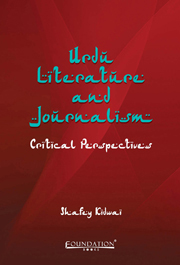Book contents
- Frontmatter
- Dedication
- Contents
- Preface
- Introduction
- Acknowledgements
- 1 Post-Independence Urdu Short Story
- 2 Post-Partition Urdu Poetry
- 3 Structuralism and Post-structuralism in Urdu Criticism
- 4 Jayant Parmar
- 5 Firaq as a Critic
- 6 Ghalib Criticism
- 7 Literature, Culture and Social Consciousness
- 8 The Influence of Tagore on Urdu Literature
- 9 Early Journalistic Endeavours of Sir Syed Ahmad Khan
- 10 Pioneering the First Urdu Book on Journalism
- 11 The Contribution of Urdu Journalists to the First War of Independence
- 12 Abul Kalam Azad's Journalistic Conquests
- Index
11 - The Contribution of Urdu Journalists to the First War of Independence
Published online by Cambridge University Press: 05 October 2014
- Frontmatter
- Dedication
- Contents
- Preface
- Introduction
- Acknowledgements
- 1 Post-Independence Urdu Short Story
- 2 Post-Partition Urdu Poetry
- 3 Structuralism and Post-structuralism in Urdu Criticism
- 4 Jayant Parmar
- 5 Firaq as a Critic
- 6 Ghalib Criticism
- 7 Literature, Culture and Social Consciousness
- 8 The Influence of Tagore on Urdu Literature
- 9 Early Journalistic Endeavours of Sir Syed Ahmad Khan
- 10 Pioneering the First Urdu Book on Journalism
- 11 The Contribution of Urdu Journalists to the First War of Independence
- 12 Abul Kalam Azad's Journalistic Conquests
- Index
Summary
India's awe-inspiring evolution from a fragmented, nascent and peripheral country to an invincible world power owes much to its inhabitants, who, notwithstanding their different religious, ethnic, linguistic and geographical affiliations, espoused the cause of nation building. Much ink has been spent over the invaluable contribution of different religious, social and linguistic groups and also the political parties who put up a fight against subjugation and exploitation but the stupendous contribution of the Urdu speaking people, especially Urdu journalists, has hardly been made the object of in-depth analysis. This chapter is aimed at supplementing what has been ignored deliberately or unwittingly, since long.
Seldom does the Muslim-dominated, protest-prone Urdu press awake one's memories of the sterling role that it played during India's first war of independence. The contemporary Urdu press, the third largest numerically, has largely been perceived as a body of casual writing that borders on the highly sentimental ‘kitsch’. The debatable nature of such a widely-held view could only be deflated, if the role of the Urdu press, during the eventful period of the freedom struggle, is made the object of a close study. It looks pertinent to turn one's attention to Urdu journalists who wielded their pens to rouse feelings against the alien rule, as a result of which the British took severe punitive measures against them.
- Type
- Chapter
- Information
- Urdu Literature and JournalismCritical Perspectives, pp. 156 - 166Publisher: Foundation BooksPrint publication year: 2014

